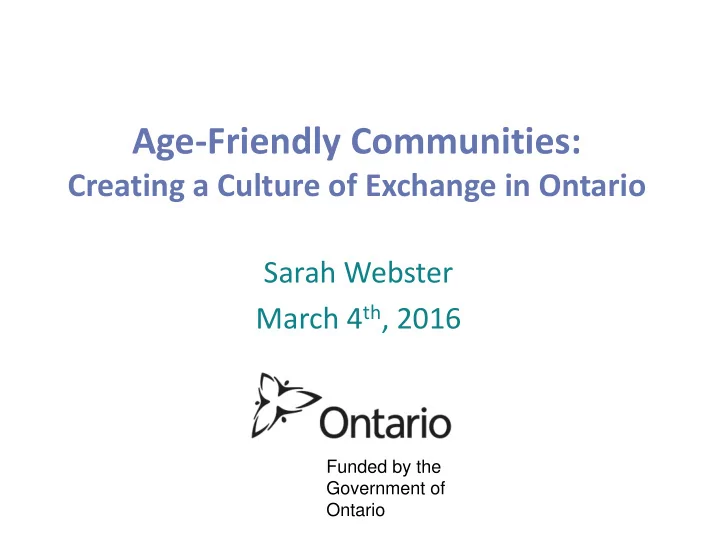

Age-Friendly Communities: Creating a Culture of Exchange in Ontario Sarah Webster March 4 th , 2016 Funded by the Government of Ontario
Session Overview • Overview of Age-Friendly Communities (AFC) • Evolving Strategy in Ontario • Ontario Age-Friendly Community Planning Outreach Initiative • Trends, common challenges
Ageing is the success of the 20 th century and the challenge of the 21st
Global Age-friendly Cities: A Guide • WHO and the Age-Friendly movement – Global Age-friendly Cities: A Guide – Checklist of Essential Features of Age-friendly Cities • Definition: “ An age-friendly city is a city that encourages active ageing by optimising opportunities for health, participation and security in order to enhance quality of life as people age. ” 4
Eight Features of an AFC: Physical Environment 1. Outdoor spaces and public buildings that are pleasant, clean, secure and physically accessible 2. Public transportation that is accessible and affordable. 3. Housing that is affordable, appropriately located, well built, well designed and secure. World Health Organization’s (WHO) Global Age -Friendly Cities: A Guide
Eight Features of an AFC: Social Environment 4. Opportunities for social participation in leisure, social, cultural and spiritual activities with people of all ages and cultures. 5. Older people are treated with respect and are included in civic life. 6. Opportunities for employment and volunteerism that cater to older persons’ interests and abilities. World Health Organization’s (WHO) Global Age -Friendly Cities: A Guide
Eight Features of an AFC: Personal well-being 7. Age-friendly communication and information are available. 8. Community support and health services are tailored to older persons’ needs . World Health Organization’s (WHO) Global Age -Friendly Cities: A Guide
Distribution of the 800 AFCs in Canada (2012) Public Health Agency of Canada
Ontario Initiatives: AFC Planning Guide 2013 : • Creation and publication of “Finding the Right Fit” Age - Friendly Community Planning Guide • The Ontario Seniors’ Secretariat (OSS), the Accessibility Directorate of Ontario (ADO), the Universities of Waterloo and McMaster and a broad Advisory Group
Finding the Right Fit: A Planning and Implementation Framework • Explains the characteristics of an age-friendly community. • Provides a ‘one - stop shop’ for a broad range of existing AFC resources. • Recognizes that collecting information that reflects or captures the characteristics of your community as broadly as possible is critical to a successful AFC initiative. • Offers those working on AFC initiatives a framework for making informed choices
Finding the Right Fit: A Planning and Implementation Framework • Step 1: Define Local Principles • Step 2: Assess Needs • Step 3: Develop an Action Plan • Step 4: Implement and Evaluate
Ontario Initiatives: AFC Planning Grants 2015-2017 • 33 for one year and 23 for two year duration of project • Majority relate to creation of committee, defining local principles and needs assessment (48) – Includes communities in North, Aboriginal and special ethnic needs • 5 engaged in implementation • 3 evaluation of previous plan and refresh
Ontario’s Strategy: AFC Planning Grants
AFCs East
Ontario's Strategy: AFC Planning Outreach Initiative 2015-2017 • Partnership of: – Universities of Waterloo, Queen’s and Huntington/Laurentian – Senior’s Health Knowledge Network (SHKN) – Ontario Interdisciplinary Council of Aging (OICAH) • Three main components 1. Pilot Community Support 2. Educational Resources 3. Knowledge Translation and Exchange
A Culture of Exchange Locally • Steering Committees, Advisory Groups, Working Groups etc. • Websites & social media
A Culture of Exchange Regionally • Southern Ontario Age-Friendly Network • Northern Ontario Age-Friendly Network
A Culture of Exchange Provincially • www.agefriendlyontario.ca – 61 community profiles • 931 total participants have participated in 5 webinars • 454 people on provincial distribution list • 168 questions to the knowledge broker
Sharing Success • Process-Level • Community-Level Projects. E.g.: – Housing – Age-friendly Businesses – Stop-Gap Ramps – Seniors’ Directories
Discussing Common Challenges • What other templates / tools / resources have been developed? • How do we ensure that our work captures the needs of special populations? • How do we engage specific partners in this process? • How do we sustain our success when the funding runs out? • What are the strengths/ challenges of the different local AFC models of support? E.g.: – Consultant-led versus building internal capacity – municipal committee versus community network versus council on aging
Why Exchange Matters • Spread success • Accelerate timelines • Quality improvement • Share resources and knowledge to address common challenges 21
Thank you! • Sarah Webster – swebster@seniorshealthknowledgenetwork.com – 1-844-276-5756 • Provincial distribution list: http://bit.ly/1N7v8rw • Provincial website: www.agefriendlyontario.ca
Recommend
More recommend